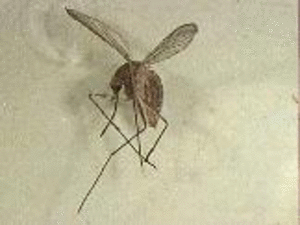
The Arizona Department of Health Services on Thursday reported the state’s first death from West Nile Virus in 2008.
Tests from the Arizona State Health Laboratory indicated that a woman in her 80s from Maricopa County died from West Nile Virus encephalitis this month.
“The recent monsoon activity has kick started the West Nile Virus season in Arizona,” said Craig Levy, manager of the state’s Vector-Borne Disease program. “This tragic death is a reminder of the importance of protecting yourself against mosquito bites.”
“Ridding your home of standing water translates to ridding your property of mosquitoes,” said Dr. Bob England, director of Maricopa County Public Health. “This small effort could make all the difference in protecting a loved one from West Nile virus.”
Other indicators of increased West Nile activity include West Nile positive mosquito pools in Maricopa, Pinal and Yuma counties. In addition, West Nile positive “sentinel chickens” have been identified in Cochise, Graham, Pinal, Santa Cruz, Greenlee and Pima counties.
Since its first arrival in Arizona in 2003, more than 750 residents have been infected with the disease. Forty-two deaths have been attributed to West Nile in the state, including seven last year.
“Be prepared,” Levy urged. “Use insect repellent, and wear protective clothing, especially between dusk and dawn and in areas where mosquitoes are active. One of the most important things we can do is to be sure we are not raising mosquitoes in our pools, ponds and birdbaths”
The state has established a web site, http://www.westnileaz.com, and a toll-free number, 1-800-314-9243, (Metro Phoenix: 602-364-4500), to provide additional information.
West Nile Virus is transmitted to humans and animals through mosquito bites. Mosquitoes become infected when they feed on infected birds.
The best way to protect yourself from mosquito-borne illness is to reduce the number of mosquitoes around your home and neighborhood and to take personal precautions to avoid mosquito bites, such as:
* Eliminate standing water where mosquitoes can breed. Check for items outside the home that collect water, such as cans, bottles, jars, buckets, old tires, drums and other containers.
* Change water in flower vases, birdbaths, planters and animal watering pans at least twice a week.
* Repair leaky pipes and outside faucets, and move air conditioner drain hoses frequently.
* Avoid being bitten by mosquitoes when going outside at night by using insect repellent.
* Wear lightweight clothing that covers the arms and legs during dawn or dusk, or in areas where mosquitoes are

![O’Reilly gears up for second Maricopa location An exterior view of O'Reilly Auto Parts on John Wayne Parkway on May 2, 2024.[Monica D. Spencer]](https://www.inmaricopa.com/wp-content/uploads/2024/05/spencer-050224-oreilly-second-location-web-218x150.jpg)
![Province writer opens the athlete’s mind in new book Tom Schuman, a Province resident, poses with a copy of his new book, "My Wide World of Sports," outside his home on May 2, 2024. [Monica D. Spencer]](https://www.inmaricopa.com/wp-content/uploads/2024/05/spencer-050224-tom-schuman-sports-book-web-01-218x150.jpg)









![City gave new manager big low-interest home loan City Manager Ben Bitter speaks during a Chamber of Commerce event at Global Water Resources on April 11, 2024. Bitter discussed the current state of economic development in Maricopa, as well as hinting at lowering property tax rates again. [Monica D. Spencer]](https://www.inmaricopa.com/wp-content/uploads/2024/04/spencer-041124-ben-bitter-chamber-property-taxes-web-218x150.jpg)
![Maricopa restaurateur makes Food Network connection [Namkeen Dhaba]](https://www.inmaricopa.com/wp-content/uploads/2024/04/439456716_377105198650519_7536248579664805896_n-218x150.jpg)
![O’Reilly gears up for second Maricopa location An exterior view of O'Reilly Auto Parts on John Wayne Parkway on May 2, 2024.[Monica D. Spencer]](https://www.inmaricopa.com/wp-content/uploads/2024/05/spencer-050224-oreilly-second-location-web-100x70.jpg)
![Province writer opens the athlete’s mind in new book Tom Schuman, a Province resident, poses with a copy of his new book, "My Wide World of Sports," outside his home on May 2, 2024. [Monica D. Spencer]](https://www.inmaricopa.com/wp-content/uploads/2024/05/spencer-050224-tom-schuman-sports-book-web-01-100x70.jpg)

